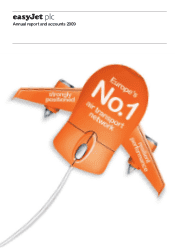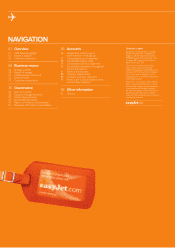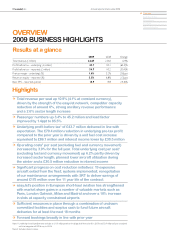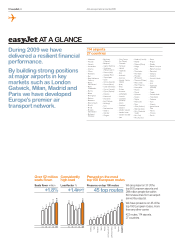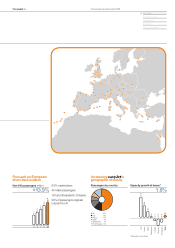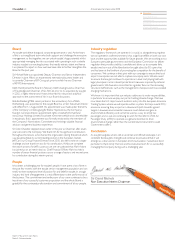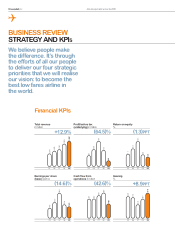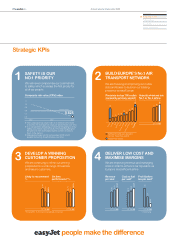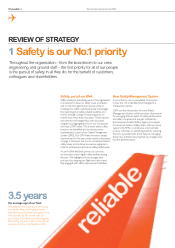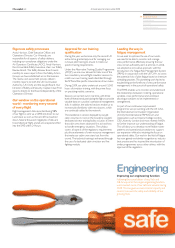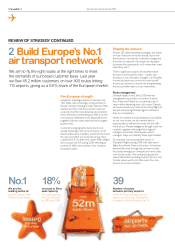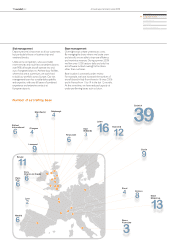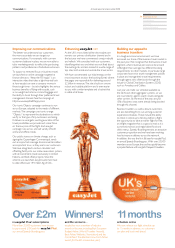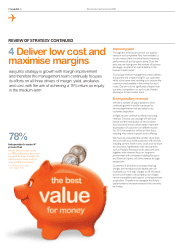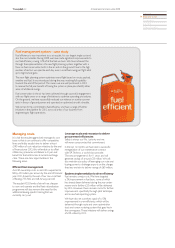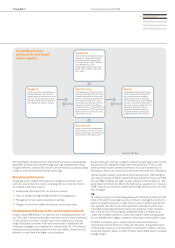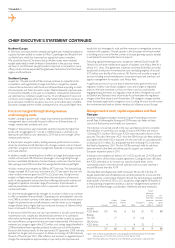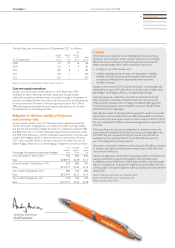EasyJet 2009 Annual Report Download - page 11
Download and view the complete annual report
Please find page 11 of the 2009 EasyJet annual report below. You can navigate through the pages in the report by either clicking on the pages listed below, or by using the keyword search tool below to find specific information within the annual report.
Annual report and accounts 200909 easyJet plc
q
Overview
Business review
Governance
Accounts
Other information
Engineering
Improving our engineering function
Following the consolidation of easyTech and
GB Airways into the easyJet engineering function,
we insourced some of our technical services during
2009. This has given us more internal capacity and
control to ensure the safety and reliability of our
growing eet.
Rigorous safety processes
Andy Harrison, Chief Executive Ofcer, and
Operations Director, Cor Vrieswijk, are
responsible for all aspects of safety delivery,
including our compliance obligations under the
Air Operators Certicate (AOC). Andy Harrison,
the Accountable Safety Executive, chairs our Safety
Review Board. The Safety Review Board meets
monthly to assess reports from the Safety Action
Groups we have established across the business.
This review and assessment process delivers
monthly reports to both the UK Civil Aviation
Authority (UK CAA) and the easyJet Board. Our
Director of Safety and Security, Captain Dave Prior,
reports directly to the Board independently of the
Operations Director.
Our window on the operational
world – monitoring every second
of every flight
Flight management data recorded during 98%
of our ights is sent via a GPRS link direct to our
Luton base as soon as the aircraft has touched
down. Several thousand megabytes of data are
transmitted per ight, and all are analysed and fed
into the SMS within 24 hours.
Approval for our training
qualification
During the year, we became only the second UK
airline to be granted approval for managing our
in-house pilot training to ensure it meets our
specic training requirements.
Under the Alternative Training Quality Programme
(ATQP), we are now allowed to tailor one of the
two mandatory annual ight simulator sessions to
match our own training needs identied through
the SMS and the specic circumstances of our routes.
During 2009, our pilots undertook around 15,000
hours of simulator training, with the prime focus
on practising realistic scenarios.
Sessions are carried out in real time, with three
levels of threat introduced during the ight, to provide
valuable data on our pilots’ operational management
skills. In addition, the tailored sessions enable us to
increase pilot familiarity with new airports, which
are continually added to the network.
The excellence in service displayed by easyJet
cabin crew has its roots in the Academy, easyJet’s
dedicated aircrew training facility at Luton. It’s here
that cabin crew learn advanced rst aid and how
to handle emergency situations. The syllabus
covers all aspects of the regulatory requirements
plus those elements of crew resource management
that make our cabin crew stand out from the
crowd. The technical training is enhanced through
the use of a dedicated cabin simulator and re
ghting module.
Leading the way in
fatigue management
As we seek to optimise the use of our assets,
we need to be able to monitor and manage
crew performance effectively, ensuring that our
crew remain sufciently alert at all times. In 2006,
we adopted an innovative approach, with the
introduction of a Fatigue Risk Management System
(FRMS) in conjunction with the UK CAA, to assess
the potential risks of pilot fatigue based on intensive
scheduling practices. This pioneering work has led to
easyJet being at the forefront of crew performance
management, in the pursuit of operational safety.
The FRMS enables us to monitor and understand
the relationships between rostering, operational
variables, crew performance and workload,
allowing procedures to be implemented or
strengthened.
As part of our continuous improvement
programme, we are working with the UK CAA,
the International Civil Aviation Organisation
(ICAO), the International FRMS forum and
organisations such as Imperial College London,
City University London and most recently NASA,
to further improve our understanding of fatigue.
This will allow us to develop more exible roster
patterns and operational procedures to support
our expansion while also retaining the focus on
operational safety. Our work in the eld of fatigue
has now gained worldwide recognition as industry
best practice and has inspired the introduction of
similar programmes across other airlines, with the
approval of the regulators.

